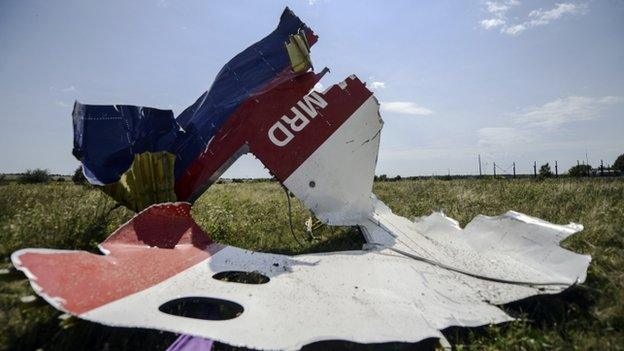MH17 Dutch memorial day: Air disaster that touched a nation
- Published
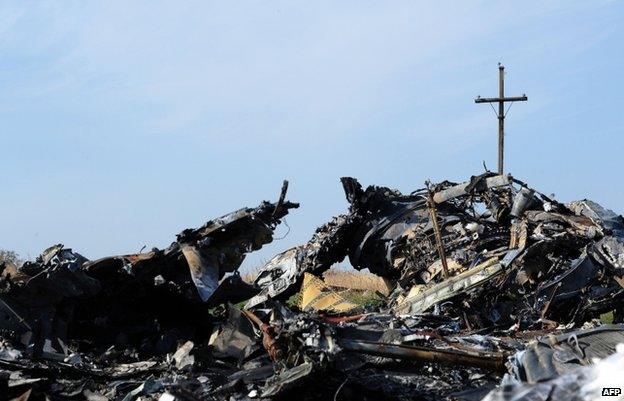
Wreckage from flight MH17 lies undisturbed at the village of Rassipnoe
Less than four months after a Malaysia Airlines plane carrying 298 people was shot out of the sky over rebel-held territory in east Ukraine, a national memorial to the victims is taking place in the Netherlands.
The names of each of the victims will be read out on Monday in front of an audience including King Willem-Alexander and Queen Maxima inside the Amsterdam RAI arena.
Such was the impact of the MH17 crash here that 17 July 2014 is often referred to as the Netherlands' 9/11.
Hundreds of relatives and friends attended the ceremony
The relatives all have agonising stories, intensified by the crash site being in a conflict zone.
The Dutch investigation team has been unable to access the area, but Robby Oehlers has been there, to search for his cousin, Daisy.
"I had a perception that I could just walk around and find her. In your dreams you see her lying there in the field."
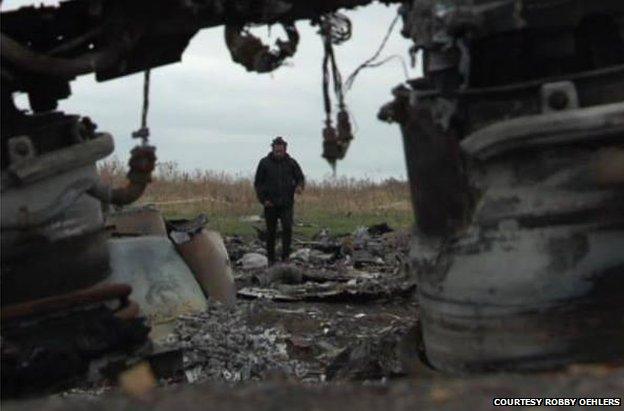
Robby Oehlers visited the crash site in the belief he could find his cousin's remains
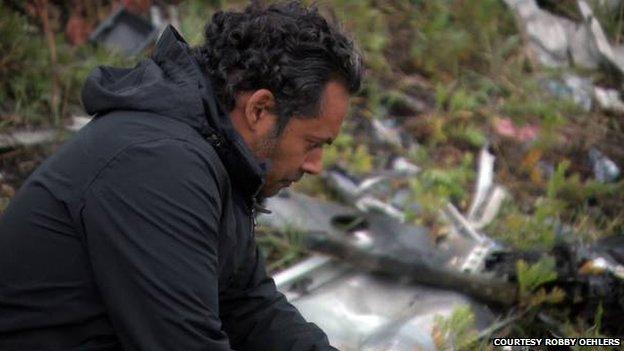
What he found shocked him: bodies still concertinaed in their seats
All that the forensic teams have found so far is a piece of Daisy's hip bone. For many of the 298 families, tiny fragments such as these are all they have to mourn.
"You don't know if you'll get anything else," says Robby. "So then there's the question, do we bury this tiny piece or should we wait for more?"
Daisy, 20, was off on an adventure with her boyfriend, Bryce. The young couple lived together at his parents' home in Rotterdam.
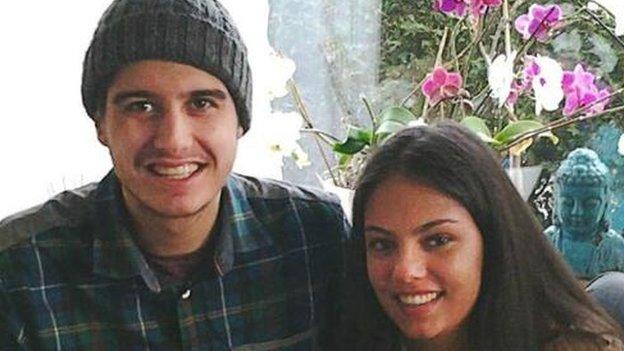
Robby felt it was his duty to search for his cousin Daisy and her boyfriend Bryce
The room has been left the way it was the day they left. Rumpled sheets on the bed, the door swung open in excitement. His family are determined to retain what little traces of them remain.
Sitting on the bow of his houseboat in Amsterdam, Robby describes the duty he felt to search for the couple.
Unlike the Dutch government, he negotiated with the pro-Russian rebels to reach the site and was astounded by what he found.
Bodies still concertinaed between the seats; burnt and broken pieces of bone.
He is one of many relatives confused and frustrated by the Dutch government's failure to repatriate all the passengers' body parts. "They could have talked to Ukraine and talked to the rebels to ask them to stop shooting, but they didn't."

298 victims from 10 countries
Netherlands: 196
Malaysia: 42
Australia: 27
Indonesia: 11
UK: 10
Belgium: 4
Germany: 3
Philippines: 3
Canada: 1
New Zealand: 1

For the Dutch government, it has been a point of principle not to speak to the separatists. Direct negotiations would have made the government vulnerable and open to blackmail, it was felt.
And using force was ruled out by PM Mark Rutte from the outset because of the risk of escalating the conflict.
Although the Dutch investigation team has not gone to the site, Dutch forensic scientists have been able to recover more remains and belongings, and as recently as Saturday they were flown back to Eindhoven.
Nine of the 298 victims are yet to be identified and there is little hope that they ever will.
Rebels blamed
Robby Oehlers feels more could have been done and he is angry Mr Rutte chose to visit Malaysia and Australia last week, where many of the other victims came from.
"Don't fly to other countries and say how sorry you are. Just get your trucks, get the plane, get all the body parts. Not one arm and one leg. Everything," he says.
Many Western countries have accused pro-Russian separatists of downing the flight with a surface-to-air missile. The Russians say their satellite images show a Ukrainian fighter jet in the vicinity at the time.
According to the preliminary aviation report, the Malaysia Airlines plane was hit by a large number of high-energy objects.
The criminal investigations expect to deliver their findings by 2016.
Robby's fear is the longer the mangled wreckage lies scattered in fields in eastern Ukraine, the less chance there is of ever finding the truth.
In the days after the disaster, Mr Rutte asked the country to have faith in a diplomatic solution, but Robby Oehlers has lost his.
There is no sense of urgency and it is not going to happen, he believes.
The 196 Dutch victims of MH17 came from all over the Netherlands. It is said here that everyone knew someone, or knows someone who knew someone on board.
Don Vleesenbeek lost his younger brother Erik, who was on his way to Bali.
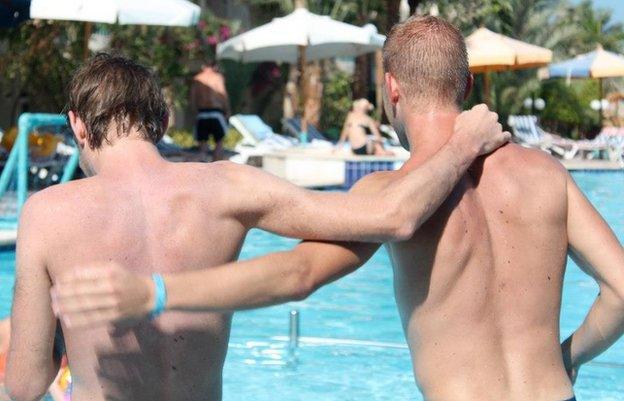
Brothers in arms: Don (L) with his younger brother Erik who had been on his way to Bali
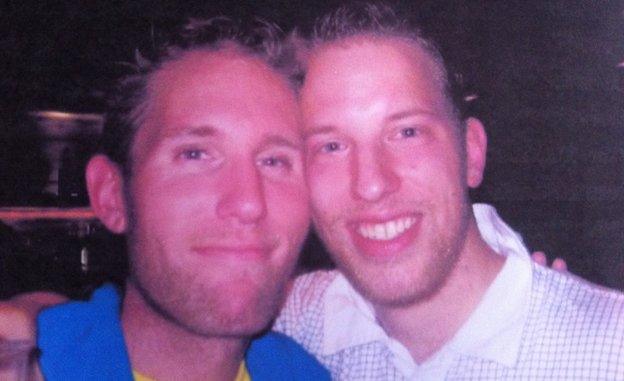
For Don Vleesenbeek, selling white wristbands came as a distraction after losing his brother Erik
"There was life before the 17th of July and life after. But they are not the same," he says at his cafe in the fortified village of Grave, a short distance outside the southern city of Nijmegen.
Don was among hundreds of relatives who stood by the side of the runway at Eindhoven air base to welcome the first military aircraft when they flew coffins carrying victims' remains back from Ukraine six days after the crash.
At the time, he was wearing a white wristband with the message, "We will never forget you".
He went on to sell 50,000 of these wristbands to raise money for charity and offer other families and supporters a silent way to show their sympathy.
"My brother was always smiling. He always wanted to help people. Selling the wristbands was just a spontaneous decision, I suppose I needed a distraction."
He still wears one, and he has had Erik's name tattooed on his left forearm.
After leaving Don's café, we head east to Rosmalen, a small town hit by a double tragedy.
'Now there is nothing'
Two families, living opposite each other on Grote Pagestraat, were both on board flight MH17.
The Truggs and the Wels had three children between them. In total, there were 80 children on the plane.
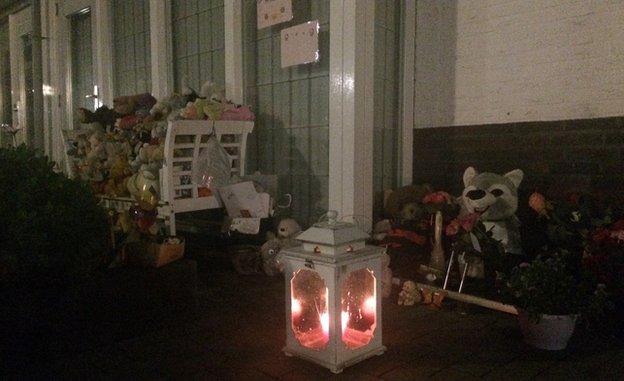
A mountain of cuddly toys stands outside their front doors and a candle flickers outside. These family homes seem frozen in time.
Elsemiek from The Hague, a 17-year-old, was Hans de Borst's only child.
Although he offers me black coffee, croissants and currant buns his mind is elsewhere. His living room is bursting with her memory.
"I keep on expecting her to walk through the door. Or to come cycling over.
"She was my future. And now there is nothing."
One photo shows Elsemiek grinning beside her father; it was taken just a few days before her death.
"I get angry when people tell me it must have been her time. It wasn't her time. She was just becoming a young woman. She knew what she wanted. She had big plans for the future."
Hans hasn't been back to work since the disaster. He says he's lost his reason for living. He is still struggling to make sense of why his daughter is no longer there.
"It is your own flesh and blood. She was part of me and now she's gone."
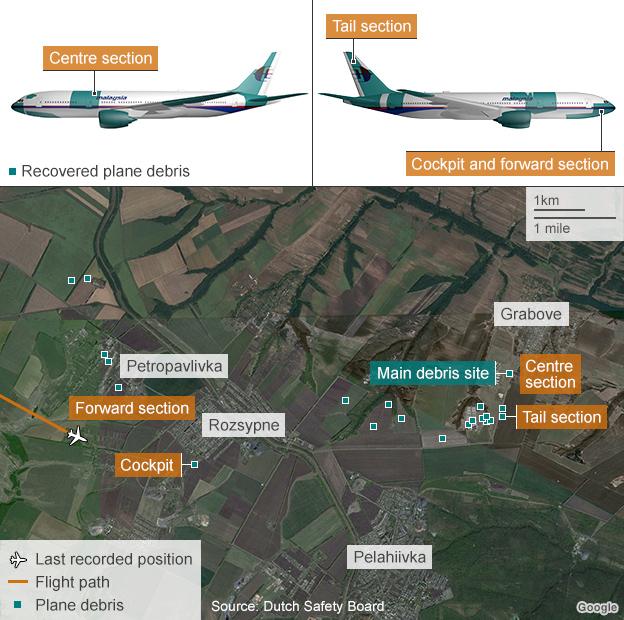
Parts of the plane were found 8km (5 miles) from the main debris site
- Published26 February 2020
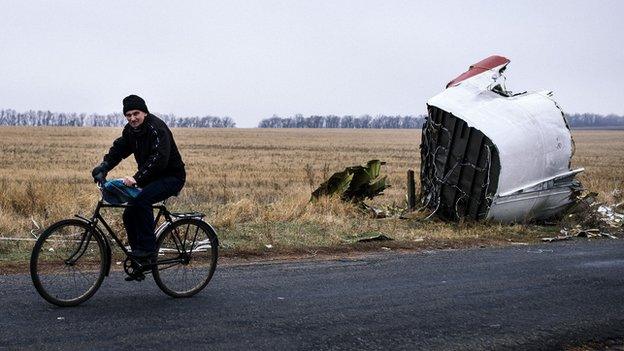
- Published9 September 2014
- Published9 October 2014
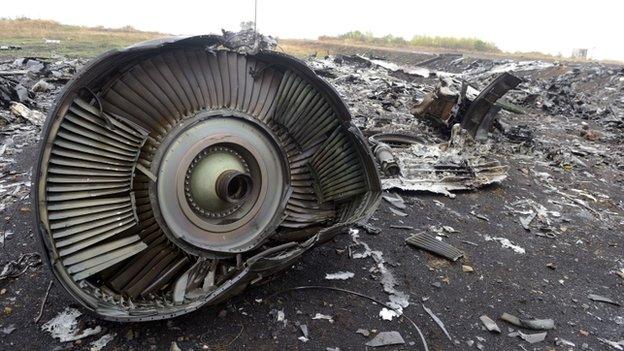
- Published8 September 2014
